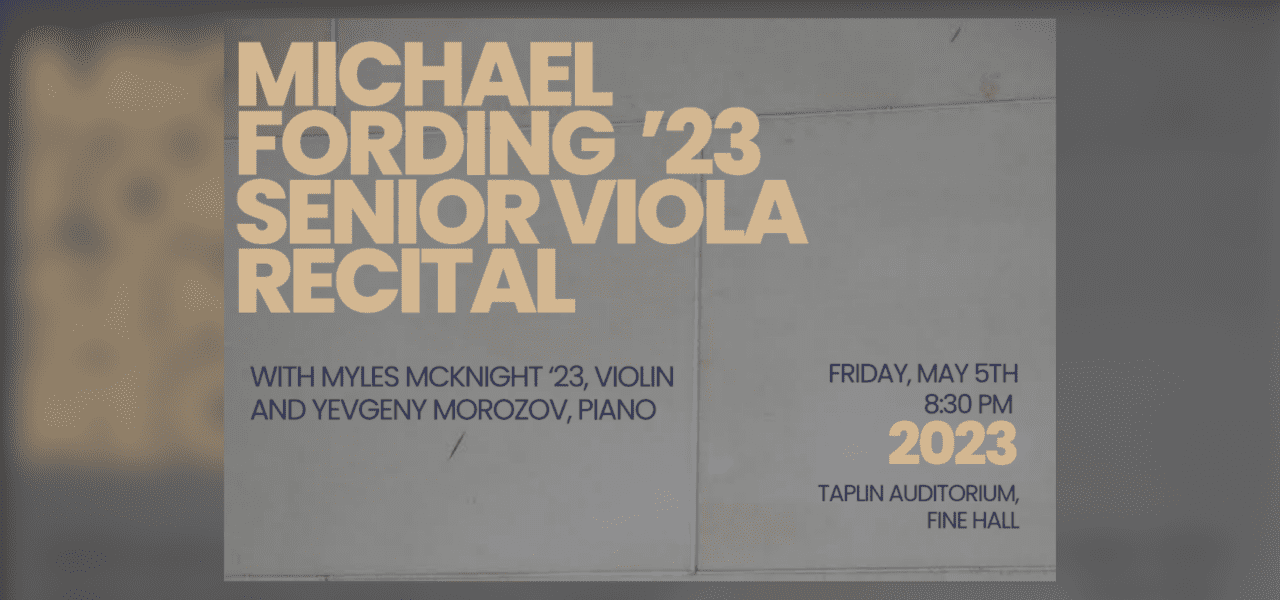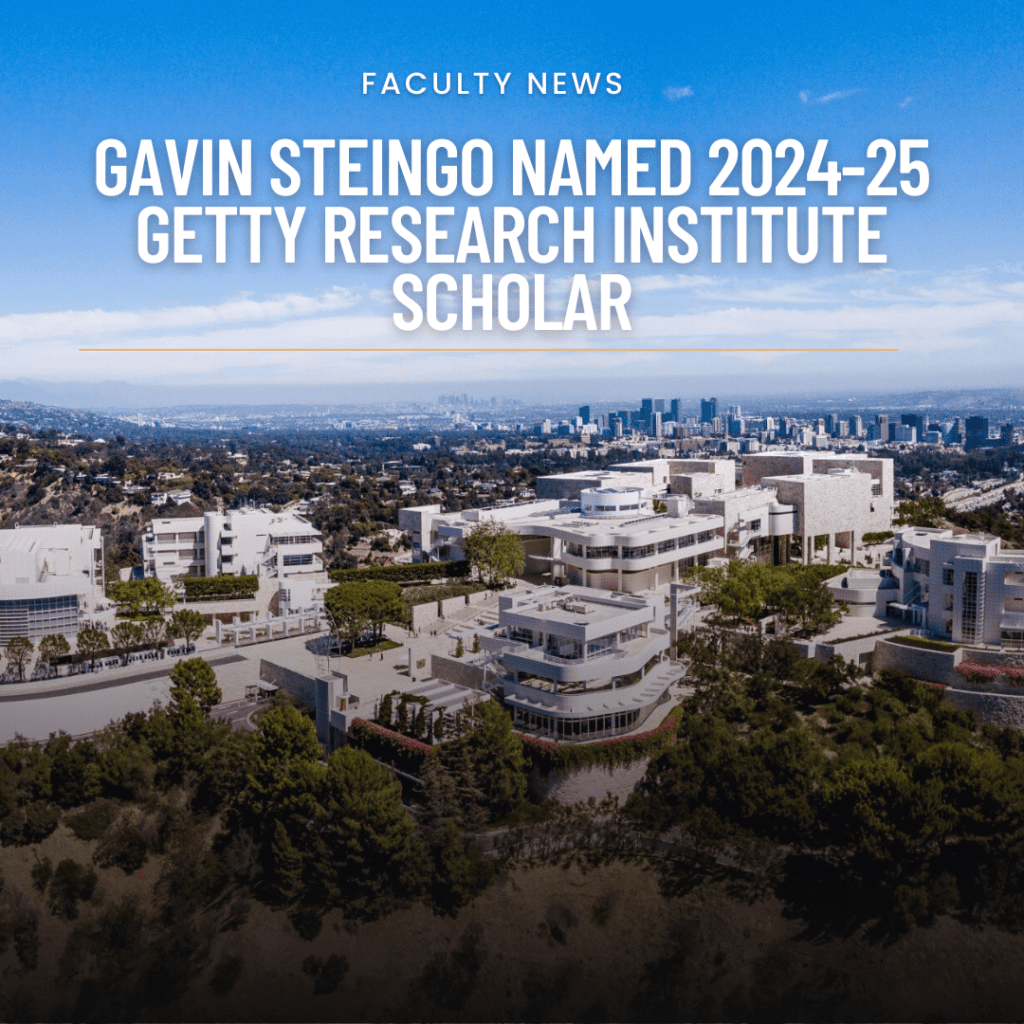Please consult our COVID-19 policies and resources for guidance on attending public performances.

Certificate Recital: Michael Fording, Viola
Presented by Princeton University Music Department
date & time
Fri, May 5, 2023
8:30 pm - 9:30 pm
ticketing
Free, unticketed
- This event has passed.

Michael Fording ’23 (Viola) performs a senior recital.
Program
W.A. MOZART String Duo for Violin and Viola in G Major, K. 423 (with Myles McKnight, violin)
Allegro
Adagio
Rondeau: Allegro
PAUL HINDEMITH Sonata for Viola and Piano, Op. 11 No. 4 (with Yevgeny Morozov, piano)
Fantasie
Thema mit Variationen
Finale (mit Variationen)
SHULAMIT RAN Perfect Storm
REBECCA CLARKE Morpheus (with Yevgeny Morozov, piano)
ROBERT SCHUMANN Adagio and Allegro, Op. 70 (with Yevgeny Morozov, piano)
PROGRAM NOTES
By Michael Fording
W.A. Mozart – String Duo for Violin and Viola in G Major, K. 423
Mozart’s string duos (K. 423 and 424) were composed in Salzburg in 1783. The
Prince-Archbishop of Salzburg had commissioned six duos from Michael
Haydn (the brother of composer Joseph Haydn), but Mozart wrote two after
Haydn was only able to complete four. Thanks to Myles for playing the first of
these duos with me.
Paul Hindemith – Sonata for Viola and Piano, Op. 11 No. 4
Hindemith, a violist, was one of the most important German composers of the
twentieth century. This sonata, composed in 1919, is one of his many works
featuring the viola. The three movements of this staple of the viola repertoire are
played without pauses. The lyrical first movement ends on an A-sharp, which
becomes a B-flat to begin the folk-like theme of the second movement. The
variations continue in the third movement.
Shulamit Ran – Perfect Storm
Israeli-American composer Shulamit Ran wrote this work for solo viola in 2010.
She incorporates a motif from Italian composer Luciano Berio’s setting of “Black
Is the Color,” one of my favorite folk songs. In her program note, Ran writes that
“the Berio motif serves as a focal point that, once established, is used as a
‘return’ moment and the point of departure for extended new elaborations.” The
work’s landscape includes sweetness and “intense, dance-like, ferocious”
stretches.
Rebecca Clarke – Morpheus
Clarke, a renowned violist, premiered Morpheus in New York in 1918. She
presented her work under the pseudonym “Anthony Trent.” As indicated by its
title, this impressionistic piece evokes a dream world through its ethereal
harmonies.
Robert Schumann – Adagio and Allegro, Op. 70
Originally written for horn in 1849, Schumann’s Op. 70 is often performed on
cello or viola. The slow beginning transitions to a lively Allegro, which ends
triumphantly.
ABOUT THE PERFORMERS
Michael Fording is a senior in the Department of Religion from Westport,
Connecticut. He studies with Jessica Thompson at Princeton and is a former student
of Erica Messina, Sarah Smale, and Asya Meshberg. He also studied with Jeffrey
Irvine and Kirsten Docter at the Bowdoin International Music Festival. He is an
alumnus of the New York Youth Symphony and the Boston University Tanglewood
Institute, where he was principal violist. He has performed in masterclasses for artists
including Sirena Huang, Mai Motobuchi, Michelle LaCourse, and Lynn Harrell. As a
chamber musician, Michael has collaborated with the American, Miró, and Ying
Quartets. He has performed at Carnegie Hall, Alice Tully Hall, Boston Symphony Hall,
and the National Opera Center in New York.
A native of Ukraine, Yevgeny Morozov is a versatile pianist who has appeared in solo
and chamber music recitals in the US, UK, Austria, Slovakia, Sweden, Netherlands,
Ireland, Iceland, and Ukraine, performing in venues including Weill Hall, National
Concert Hall in Dublin, Slovak Philharmonic Hall in Bratislava, and the National Opera
of Ukraine in Kiev. He has appeared as soloist with the Slovak Philharmonic Orchestra,
National Symphony Orchestra of Ukraine, BBC Scottish Symphony Orchestra, and
Royal Scottish Academy Symphony Orchestra, among others. Mr. Morozov is a
laureate of numerous international piano competitions, including the Prokofiev
International Music Festival (Moscow), Kil’s International Piano Competition
(Sweden), and J. N. Hummel International Piano Competition (Slovakia). His awards
also include the Dorothy Mackenzie Artists Recognition Award (NYC), Semifinals
(third round) Prize of the Dublin International Piano Competition, and the Yamaha
Music Foundation of Europe Scholarship Award (London).
Yevgeny Morozov regularly collaborates in chamber music performances, drawing
on extensive experience with flute, violin and brass repertoire. He has served as a
collaborative pianist for Conductors Retreat at Medomak with Kenneth Kiesler, piano
accompanist for Yamaha Masterclass with Karl-Heinz Kammerling, and for
masterclasses of the principal flutist of the Chicago Symphony Orchestra Stefán
Höskuldsson (NYC), and for internationally renowned flutist Paul Edmund-Davies
(Philadelphia). His experience as an accompanist also includes various national level
events: the National Flute Association (NFA), NJMTA, MTNA competitions and
events, as well as Philadelphia Orchestra Greenfield competition, Cooper
International Violin competition, and lessons and recitals at the Juilliard Pre-College
and Rutgers University.
PROGRAM NOTES
By Michael Fording
W.A. Mozart – String Duo for Violin and Viola in G Major, K. 423
Mozart’s string duos (K. 423 and 424) were composed in Salzburg in 1783. The
Prince-Archbishop of Salzburg had commissioned six duos from Michael
Haydn (the brother of composer Joseph Haydn), but Mozart wrote two after
Haydn was only able to complete four. Thanks to Myles for playing the first of
these duos with me.
Paul Hindemith – Sonata for Viola and Piano, Op. 11 No. 4
Hindemith, a violist, was one of the most important German composers of the
twentieth century. This sonata, composed in 1919, is one of his many works
featuring the viola. The three movements of this staple of the viola repertoire are
played without pauses. The lyrical first movement ends on an A-sharp, which
becomes a B-flat to begin the folk-like theme of the second movement. The
variations continue in the third movement.
Shulamit Ran – Perfect Storm
Israeli-American composer Shulamit Ran wrote this work for solo viola in 2010.
She incorporates a motif from Italian composer Luciano Berio’s setting of “Black
Is the Color,” one of my favorite folk songs. In her program note, Ran writes that
“the Berio motif serves as a focal point that, once established, is used as a
‘return’ moment and the point of departure for extended new elaborations.” The
work’s landscape includes sweetness and “intense, dance-like, ferocious”
stretches.
Rebecca Clarke – Morpheus
Clarke, a renowned violist, premiered Morpheus in New York in 1918. She
presented her work under the pseudonym “Anthony Trent.” As indicated by its
title, this impressionistic piece evokes a dream world through its ethereal
harmonies.
Robert Schumann – Adagio and Allegro, Op. 70
Originally written for horn in 1849, Schumann’s Op. 70 is often performed on
cello or viola. The slow beginning transitions to a lively Allegro, which ends
triumphantly.
ABOUT THE PERFORMERS
Michael Fording is a senior in the Department of Religion from Westport,
Connecticut. He studies with Jessica Thompson at Princeton and is a former student
of Erica Messina, Sarah Smale, and Asya Meshberg. He also studied with Jeffrey
Irvine and Kirsten Docter at the Bowdoin International Music Festival. He is an
alumnus of the New York Youth Symphony and the Boston University Tanglewood
Institute, where he was principal violist. He has performed in masterclasses for artists
including Sirena Huang, Mai Motobuchi, Michelle LaCourse, and Lynn Harrell. As a
chamber musician, Michael has collaborated with the American, Miró, and Ying
Quartets. He has performed at Carnegie Hall, Alice Tully Hall, Boston Symphony Hall,
and the National Opera Center in New York.
A native of Ukraine, Yevgeny Morozov is a versatile pianist who has appeared in solo
and chamber music recitals in the US, UK, Austria, Slovakia, Sweden, Netherlands,
Ireland, Iceland, and Ukraine, performing in venues including Weill Hall, National
Concert Hall in Dublin, Slovak Philharmonic Hall in Bratislava, and the National Opera
of Ukraine in Kiev. He has appeared as soloist with the Slovak Philharmonic Orchestra,
National Symphony Orchestra of Ukraine, BBC Scottish Symphony Orchestra, and
Royal Scottish Academy Symphony Orchestra, among others. Mr. Morozov is a
laureate of numerous international piano competitions, including the Prokofiev
International Music Festival (Moscow), Kil’s International Piano Competition
(Sweden), and J. N. Hummel International Piano Competition (Slovakia). His awards
also include the Dorothy Mackenzie Artists Recognition Award (NYC), Semifinals
(third round) Prize of the Dublin International Piano Competition, and the Yamaha
Music Foundation of Europe Scholarship Award (London).
Yevgeny Morozov regularly collaborates in chamber music performances, drawing
on extensive experience with flute, violin and brass repertoire. He has served as a
collaborative pianist for Conductors Retreat at Medomak with Kenneth Kiesler, piano
accompanist for Yamaha Masterclass with Karl-Heinz Kammerling, and for
masterclasses of the principal flutist of the Chicago Symphony Orchestra Stefán
Höskuldsson (NYC), and for internationally renowned flutist Paul Edmund-Davies
(Philadelphia). His experience as an accompanist also includes various national level
events: the National Flute Association (NFA), NJMTA, MTNA competitions and
events, as well as Philadelphia Orchestra Greenfield competition, Cooper
International Violin competition, and lessons and recitals at the Juilliard Pre-College
and Rutgers University.

